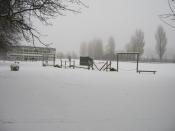Paper #3 - Response Paper with Thesis Most parents have high expectations for their children. They encourage good grades, responsible friends and sensible decisions. The ending result of these expectations, however, can produce the totally opposite and undesirable effects. Pressures mounting from high expectations, whether purposely or unknowingly, will sometimes result in an unplanned backlash of emotions and actions. As with FaNee Cooper, in Calvin Trillins "It's Just Too late", the unspoken pressures were constantly present in her life. As with any child raised in a two-parent family, certain thing s are expected of them, but nonetheless, the level of expectation should never so high as to discourage the child itself.
It is evident from the first paragraph of the tragedy; FaNee is considered an ideal child. Doing all the good things an ideal child should, like winning spelling contests, attending church devoutly, and helping out with younger siblings. With the picturesque image of perfect parents, came also the notion of the perfect family.
The father, principal of the town's Junior High School and the mother a soft-spoken art teacher at the town's High School. The obvious result of this union can produce nothing less than perfect. FaNee knew what everyone expected from her and it is apparent that she tried to keep up that image. She did all the proper and right things and when she did wrong she hid what she did, not wanting to shame herself or her parents. The cigarettes and her Grandmother's keepsakes. Her parent's hurt, from what they thought was a child's rebellion, came through as disappointment. Despite her attempts to live to the expectations of her parents, it was apparent that FaNee did not feel comfortable living in the image of her ideal parents. Her so-called rebellion cannot really be classified as defiance, but rather as an act of independence. The fact that she seems to do all these things to please her parents, justifies her desires to rebel and satisfy her own expectations.
As the story progresses, FaNee begins to give up the image that she struggled to maintain. Overwhelmed with the feeling that it was too late, she no longer hides her imperfections. She, most likely, decides to take on a new outlook of her life and re-evaluates who she wants to be. This is not to say that what she benefited from her change in any way, but nonetheless it was a statement that she was going to be who she was at any cost. Instead of being that ideal child and live up to the dream, so to speak, she goes in the opposite direction. FaNee finds comfort in the shadow of the freaks and outcasts, feeling that she fits in better with this group. She no longer wishes to rise to anyone else's standards and be something she was not as demonstrated in the quote, "I guess she figured she couldn't be the best"æ. So she decided she might as well be the worst".
The unspoken expectations from FaNee's parents had finally backfired by the time she reached high school. She no longer could relate to her parents or even place herself in the same category as them. In a brief session with Jim Griffin, a counselor friend of the Leo Cooper, FaNee makes the distinction between her and her parents saying, "they were who they were, and she was who she was, and there did not happen to be any connection". There was a drastic transformation in FaNee from when she was younger up until she entered the ninth grade. In the beginning of the essay it is mentioned how she wrote a poem in remembrance of her Grandmother, after she passed away, about the afterlife and heaven, but in high school her writing began to illustrate morbid and disturbing scenarios. In one of her poems she writes, "Slithering serpents bite my ass, while tornadoes derail and ever so swiftly destroy every car in my train of thought".
The question that remains throughout these chain of events is, where were her parents in the midst of her identity crisis? The obvious answer would be to place them along the sidelines with their selfish objective, hoping to still create their perfect child. One would think that they would address her initial problems and assess the situation accordingly, but their focus was elsewhere. While the father was building his authoritative status as principal of Gresham Junior High, his own daughter lacked the discipline of any student under his authority. Perhaps FaNee felt that the things expected of her, perfection, were things that were unattainable to her. Maybe it was her glasses or her braces; maybe it was even the fact that her younger sister was so much closer to being the perfect child that she gave up. With these things in mind, it is fairly easy to sympathize with her determination to prove to everyone she can stand out and still get attention. The worst part of the essay occurs after FaNee's horrible death, where she finally gets that attention from her father that she may have been yearning for from the get go. In her last moments Leo Cooper attests his remorse for his daughter and having the pleasure of being with her before she died. It seems so sad to know that it took FaNee's death to open up parent's eyes as to what problems their child had.
Drawing from all this, one can easily make a generalization that this essay strives to say that placing expectations or pressure on your child to achieve is wrong. Rest assure though, that these are the farthest from the intent. The notion to be gained here is to draw a line between expecting their best and expecting the best. FaNee remains a good example of what could go terribly wrong if your expectations fail, not to say the end result will be drugs, alcohol, or even death (as in FaNee's case), but rest assure this could be a possibility. The only advice that comes to mind when it comes to place your child within exceptional margins and do not press them too hard to achieve goals you chosen for them, but rather help them achieve goals they set for themselves.





